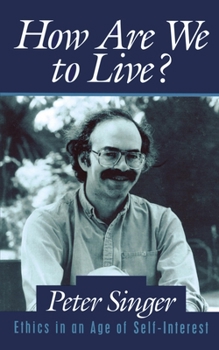How Are We to Live?: Ethics in an Age of Self-Interest
Select Format
Select Condition 
Book Overview
"Is there still anything worth living for? Is anything worth pursuing, apart from money, love, and caring for one's own family?" Internationally known social philosopher and ethicist Peter Singer has an answer to these and other questions in this compelling new volume. "If we can detach ourselves from our own immediate preoccupations and look at the world as a whole and our place in it, there is something absurd about the idea that people should have...
Format:Paperback
Language:English
ISBN:0879759666
ISBN13:9780879759667
Release Date:May 1995
Publisher:Prometheus Books
Length:272 Pages
Weight:0.83 lbs.
Dimensions:0.6" x 5.3" x 8.5"
Customer Reviews
5 ratings
Well-researched accessible ethics.
Published by Thriftbooks.com User , 17 years ago
Unlike some of Peter Singer's other books, "How are we to live" is not a comprehensive opus on ethics, the history of ethics, or ethical systems. It is a book about the ethical dilemmas faced by modern self-interested Western society, and it is intended for a general audience rather than an academic one. I'm not a student or scholar of philosophy or ethics, yet I had no trouble understanding the content of this book, as such, I think it fulfils the author's aim of being accessible to lay readers. Early in the book, Singer presents some fascinating historical analysis of tends related to individual greed in the 1980s leading into the 1990s. It is worth reading for the first few chapters alone, where this analysis is presented. This book was published in the mid-1990s, and it shows substantial foresight. In later chapters, Singer talks about the need to take action to abate global warming and the greenhouse effect - a problem that is only now gaining the support of the general public. Peter Singer is a well-known advocate of animal rights and vegetarianism. His position on these subjects pops up regularly throughout the book and his personal values on this issue are unmistakable. As an omnivore, I have to concede that he made some very good points about the impact of meat eating on the environment; and about the treatment of non-human animals - I have been cutting down on meat since I read this book. I only have two reservations about the book. First, there is a chapter on Japanese society which does not seem to lead to any clear-cut point or conclusion that is related to the rest of the content of the book. Second, Singer's argument in the final chapter is that people who act ethically will lead happier lives, but the evidence he presents for this is scant. As it happens, I agree with him, that people who live outward-looking ethical lives will, more than likely, be happier people. As a philosophical speculation, it's an interesting one, and I think modern psychology is beginning to find the evidence to support this claim.
Every person on this planet should read this book!
Published by Thriftbooks.com User , 24 years ago
An extremely important and relevant work from a highly intelligent,committed and ethical individual.Singer's clear and readable expounding of an enlightening yet surprisingly simple ethical outlook definitely has the potential to change, for the better, a readers approach both to their own life and to their relationships to others, both human and non-human.An absolute gem!
An audacious undertaking, and Singer pulls it off
Published by Thriftbooks.com User , 25 years ago
Singer tackles "the big one," the meaning of life, in this book, and damned if he doesn't figure it out. In my opinion. (Your mileage may vary.) His approach is take you through a few thousand years of philosophy/economics/political science to get to the answer that a life spent trying to help others and reduce suffering is really the most moral, and most fulfilling one. It's a fascinating, and important, book. OK. I do have one small quibble. (Forgive me, I'm a quibbler.) Singer, correctly, I think, sees some uses of psychotherapy as self-indulgent and an attempt to rationalize away the moral emptiness that comes from leading a materialistically oriented life. However, I think he underestimates the need for people to come to terms with the forces that create a self that can't keep its "owner" from suffering. You have to be able to help yourself as well as others. The process of individuation, of becoming your own creative person, is important in human happiness. It's not as moral as purely devoting yourself to others, but I think there is room for both. I don't think Singer would disagree (maybe he would?). That, I think minor, quibble aside, I think the book is a really cool exploration of a really important question that we all ask ourselves, but that few (non-religious types) have spent enough time thinking about. I, for one, am glad that Peter Singer is around and thinking about it.
You must read this book!
Published by Thriftbooks.com User , 26 years ago
Peter Singer has deliverd a masterpiece. He mangages to impart great amounts of information in a clear, readable style. This is not just a book for those interested in philosophy, but for anyone who has ever asked "What does my life's work mean anyways?" A convincing argument for the ethical life.
A terrific, beautifully written book
Published by Thriftbooks.com User , 27 years ago
This may be the best book of moral philosophy ever written for a general audience. Singer covers a large number of topics, from feminist ethics to the prisoner's dilemma, in the course of presenting a graceful and compelling argument for the moral life






